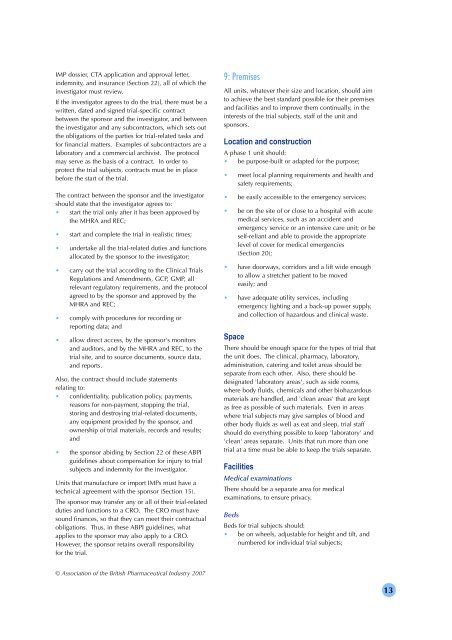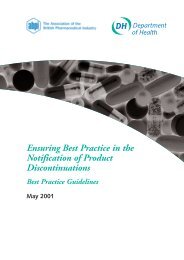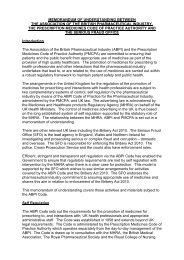ABPI Guidelines for Phase 1 Clinical Trials (PDF
ABPI Guidelines for Phase 1 Clinical Trials (PDF
ABPI Guidelines for Phase 1 Clinical Trials (PDF
You also want an ePaper? Increase the reach of your titles
YUMPU automatically turns print PDFs into web optimized ePapers that Google loves.
IMP dossier, CTA application and approval letter,<br />
indemnity, and insurance (Section 22), all of which the<br />
investigator must review.<br />
If the investigator agrees to do the trial, there must be a<br />
written, dated and signed trial-specific contract<br />
between the sponsor and the investigator, and between<br />
the investigator and any subcontractors, which sets out<br />
the obligations of the parties <strong>for</strong> trial-related tasks and<br />
<strong>for</strong> financial matters. Examples of subcontractors are a<br />
laboratory and a commercial archivist. The protocol<br />
may serve as the basis of a contract. In order to<br />
protect the trial subjects, contracts must be in place<br />
be<strong>for</strong>e the start of the trial.<br />
The contract between the sponsor and the investigator<br />
should state that the investigator agrees to:<br />
• start the trial only after it has been approved by<br />
the MHRA and REC;<br />
• start and complete the trial in realistic times;<br />
• undertake all the trial-related duties and functions<br />
allocated by the sponsor to the investigator;<br />
• carry out the trial according to the <strong>Clinical</strong> <strong>Trials</strong><br />
Regulations and Amendments, GCP, GMP, all<br />
relevant regulatory requirements, and the protocol<br />
agreed to by the sponsor and approved by the<br />
MHRA and REC;<br />
• comply with procedures <strong>for</strong> recording or<br />
reporting data; and<br />
• allow direct access, by the sponsor's monitors<br />
and auditors, and by the MHRA and REC, to the<br />
trial site, and to source documents, source data,<br />
and reports.<br />
Also, the contract should include statements<br />
relating to:<br />
• confidentiality, publication policy, payments,<br />
reasons <strong>for</strong> non-payment, stopping the trial,<br />
storing and destroying trial-related documents,<br />
any equipment provided by the sponsor, and<br />
ownership of trial materials, records and results;<br />
and<br />
• the sponsor abiding by Section 22 of these <strong>ABPI</strong><br />
guidelines about compensation <strong>for</strong> injury to trial<br />
subjects and indemnity <strong>for</strong> the investigator.<br />
Units that manufacture or import IMPs must have a<br />
technical agreement with the sponsor (Section 15).<br />
The sponsor may transfer any or all of their trial-related<br />
duties and functions to a CRO. The CRO must have<br />
sound finances, so that they can meet their contractual<br />
obligations. Thus, in these <strong>ABPI</strong> guidelines, what<br />
applies to the sponsor may also apply to a CRO.<br />
However, the sponsor retains overall responsibility<br />
<strong>for</strong> the trial.<br />
© Association of the British Pharmaceutical Industry 2007<br />
9: Premises<br />
All units, whatever their size and location, should aim<br />
to achieve the best standard possible <strong>for</strong> their premises<br />
and facilities and to improve them continually, in the<br />
interests of the trial subjects, staff of the unit and<br />
sponsors.<br />
Location and construction<br />
A phase 1 unit should:<br />
• be purpose-built or adapted <strong>for</strong> the purpose;<br />
• meet local planning requirements and health and<br />
safety requirements;<br />
• be easily accessible to the emergency services;<br />
• be on the site of or close to a hospital with acute<br />
medical services, such as an accident and<br />
emergency service or an intensive care unit; or be<br />
self-reliant and able to provide the appropriate<br />
level of cover <strong>for</strong> medical emergencies<br />
(Section 20);<br />
• have doorways, corridors and a lift wide enough<br />
to allow a stretcher patient to be moved<br />
easily; and<br />
• have adequate utility services, including<br />
emergency lighting and a back-up power supply,<br />
and collection of hazardous and clinical waste.<br />
Space<br />
There should be enough space <strong>for</strong> the types of trial that<br />
the unit does. The clinical, pharmacy, laboratory,<br />
administration, catering and toilet areas should be<br />
separate from each other. Also, there should be<br />
designated 'laboratory areas', such as side rooms,<br />
where body fluids, chemicals and other biohazardous<br />
materials are handled, and 'clean areas' that are kept<br />
as free as possible of such materials. Even in areas<br />
where trial subjects may give samples of blood and<br />
other body fluids as well as eat and sleep, trial staff<br />
should do everything possible to keep 'laboratory' and<br />
'clean' areas separate. Units that run more than one<br />
trial at a time must be able to keep the trials separate.<br />
Facilities<br />
Medical examinations<br />
There should be a separate area <strong>for</strong> medical<br />
examinations, to ensure privacy.<br />
Beds<br />
Beds <strong>for</strong> trial subjects should:<br />
• be on wheels, adjustable <strong>for</strong> height and tilt, and<br />
numbered <strong>for</strong> individual trial subjects;<br />
13









